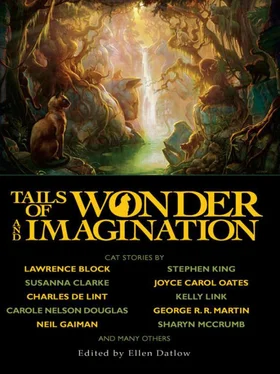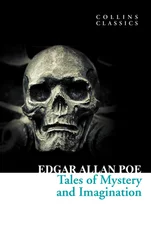Ellen Datlow - Tails of Wonder and Imagination
Здесь есть возможность читать онлайн «Ellen Datlow - Tails of Wonder and Imagination» весь текст электронной книги совершенно бесплатно (целиком полную версию без сокращений). В некоторых случаях можно слушать аудио, скачать через торрент в формате fb2 и присутствует краткое содержание. Год выпуска: 2010, ISBN: 2010, Издательство: Night Shade Books, Жанр: Фэнтези, Фантастика и фэнтези, Ужасы и Мистика, на английском языке. Описание произведения, (предисловие) а так же отзывы посетителей доступны на портале библиотеки ЛибКат.
- Название:Tails of Wonder and Imagination
- Автор:
- Издательство:Night Shade Books
- Жанр:
- Год:2010
- ISBN:978-1-59780-170-6
- Рейтинг книги:5 / 5. Голосов: 1
-
Избранное:Добавить в избранное
- Отзывы:
-
Ваша оценка:
- 100
- 1
- 2
- 3
- 4
- 5
Tails of Wonder and Imagination: краткое содержание, описание и аннотация
Предлагаем к чтению аннотацию, описание, краткое содержание или предисловие (зависит от того, что написал сам автор книги «Tails of Wonder and Imagination»). Если вы не нашли необходимую информацию о книге — напишите в комментариях, мы постараемся отыскать её.
collects the best of the last thirty years of science fiction and fantasy stories about cats from an all-star list of contributors.
Tails of Wonder and Imagination — читать онлайн бесплатно полную книгу (весь текст) целиком
Ниже представлен текст книги, разбитый по страницам. Система сохранения места последней прочитанной страницы, позволяет с удобством читать онлайн бесплатно книгу «Tails of Wonder and Imagination», без необходимости каждый раз заново искать на чём Вы остановились. Поставьте закладку, и сможете в любой момент перейти на страницу, на которой закончили чтение.
Интервал:
Закладка:
No one can hear him, though, because most of the other kids in Miss Beischer’s class are laughing uproariously at the kitten. You look around in a kind of sick stupefaction.
Milly Heckler, Agnes Lee Terrance, and a few other girls appear to be as appalled as you, but the scene doesn’t last long—it’s probably shorter than your slow-motion memory of it—and it seems for a moment that you are that kitten, that everything in the world has been wrenchingly upended.
I know it seemed to you that evil people were trying to invade and control your thoughts,” Dr. Hall, the director of Quiet Harbor, tells you. He pets a neutered male just back from a visit to the Gerontological Wing. “But that was just a symptom of the scrambled condition of your brain chemistry. The truth is…
Fatigued, you slouch out the rear gate of Rockdale Biological. Your apartment—the three-roomer that Healy provided—is only a short distance away. A late-model Lincoln Town Car pulls alongside you as you walk the weed-grown sidewalk. The tinted window on the front-seat passenger’s side powers down, and you catch your first glimpse of the raw-complexioned man who introduces himself as David Penfield. An alias? Why do you think so?
“If you like,” he says, “think of me as the Zoo Cop.”
It’s a permission you don’t really want. Why would you choose to think of a well-dressed, ordinary-featured man with visible acne scarring as something as déclassé as, Jesus, the Zoo Cop. Is he a detective of some sort? What does he want?
The next thing you know you’re in the car with Penfield and two other tight-lipped men.
The next thing you know you’re on the expressway and one of the Zoo Cop’s associates—goons?—has locked the suction-cup feet of one of those corny Garfield toys on his tinted window as a kind of—what?—mockery? rebuke? warning?
The next thing you know you’re in a basement that clearly isn’t the soup kitchen of Trinity United Methodist. The next thing you know you’re flat on your back on a table. The next thing you know you don’t know anything….
Marti’s body is stenciled with primitive blue flowers, a blossom on her neck, more on her breasts, an indigo bouquet on the milky plane of her abdomen. You gaze at her in groggy wonderment. The woman you one day marry has become, overnight, an arabesque of disturbing floral bruises.
“Marti,” you whisper. “Marti, don’t leave me. Marti, don’t take my son away.”
Penfield, a.k.a. the Zoo Cop (you realize during your descent into the puzzle box), isn’t a real cop. He hates you because what you’ve been doing for Healy is vile, contemptible, evil . So it is, so it is. He wants to get Healy, who hasn’t been around this last week at all, who’s maybe skipped off to Barbados or the Yucatan or Saint-Tropez.
Penfield is an animal-rights eco-terrorist, well-financed and determined, and the ESB zappings to which he and his associates are subjecting you are designed to incriminate, pinpoint, and doom old Dirk and his associates, who obviously deserve it. You, too. You deserve it, too. No argument there. None.
Christ, Penfield says, unhook the son of a bitch and carry him upstairs. Dump him somewhere remote, somewhere rural.
You visit the pound for a replacement for Springer and Ossie, gassed three or four years ago. The attendant tells you there are plenty of potential adoptees at the shelter. You go down the rows of cages to select one. The kittens in the fouled sawdust tumble, paw, and miaow, putting on a dispirited show.
“This one,” you finally say.
“Cute.” The attendant approves. Well, they’d fire her if she didn’t. The idea is to adopt these creatures out, not to let them lapse into expendability.
“It’s for Jake, my son,” you tell her. “His asthma isn’t that bad. I think he may be growing out of it.”
“Look at my puzzle,” Howie says, yanking the razor blade away from you. “You’ve bled all over it….”
—For Jeanne SchintoGORDON, THE SELF-MADE CAT
Peter S. Beagle
Peter S. Beagle was born in Manhattan in 1939 and raised in the Bronx. He originally proclaimed he would be a writer when ten years old, and is now acknowledged as an American fantasy icon. In addition to being an acclaimed novelist and writer of short stories and nonfiction, Peter also has written numerous plays, teleplays, and screenplays, and is a gifted poet, librettist, lyricist, and singer/songwriter. For more information about The Last Unicorn , A Fine and Private Place , Summerlong , I’m Afraid You’ve Got Dragons , I See By My Outfit , “Two Hearts,” and the rest of his work, visit www.peterbeagle.com.
“Gordon, the Self-Made Cat” started life in the late 1960s when Beagle was asked by a relatively small (and now defunct) animation company to submit ideas for possible feature-length development. Nothing came of it and the story languished until late 2001, when a friend discovered the manuscript while hunting through a rusty filing cabinet in the author’s garage. After several revisions, “Gordon” was published in Beagle’s email newsletter The Raven as a freebie and then reprinted in his collection The Line Between . He is now expanding the story into a standalone children’s book.
Beagle had a Persian cat named Princess Grace (the original of Miss Sophia Brown in his novel Tamsin ), who hung out entirely with the dogs—she never once looked at another cat—and was a fully-accepted member of the pack. “Gordon” is an outgrowth of his speculation on what a mouse equivalent of Princess Grace (“the Hussy,” as his kids called her) might be like.
Once upon a time to a family of house mice there was born a son named Gordon. He looked very much like his father and mother and all his brothers and sisters, who were gray and had bright, twitchy, black eyes, but what went on inside Gordon was very different from what went on inside the rest of his family. He was forever asking why everything had to be the way it was, and never satisfied with the answer. Why did mice eat cheese? Why did they live in the dark and only go out when it was dark? Where did mice come from, anyway? What were people? Why did people smell so funny? Suppose mice were big and people were tiny? Suppose mice could fly? Most mice don’t ask many questions, but Gordon never stopped.
One evening, when Gordon was only a few weeks old, his next-to-eldest sister was sent out to see if anything interesting had been left open in the pantry. She never returned. Gordon’s father shrugged sadly and spread his front paws, and said, “The cat.”
“What’s a cat?” Gordon asked.
His mother and father looked at one another and sighed. “They have to know sometime,” his father said. “Better he learns it at home than on the streets.”
His mother sniffled a little and said, “But he’s so young,” and his father answered, “Cats don’t care.” So they told Gordon about cats right then, expecting him to start crying and saying that there weren’t any such things. It’s a hard idea to get used to. But Gordon only asked, “Why do cats eat mice?”
“I guess we taste very good,” his father said.
Gordon said, “But cats don’t have to eat mice. They get plenty of other food that probably tastes as good. Why should anybody eat anybody if he doesn’t have to?”
“Gordon,” said his father. “Listen to me. There are two kinds of creatures in the world. There are animals that hunt, and animals that are hunted. We mice just happen to be the kind of animal that gets hunted, and it doesn’t really matter if the cat is hungry or not. It’s the way life is. It’s really a great honor to be the hunted, if you just look at it the right way.”
Читать дальшеИнтервал:
Закладка:
Похожие книги на «Tails of Wonder and Imagination»
Представляем Вашему вниманию похожие книги на «Tails of Wonder and Imagination» списком для выбора. Мы отобрали схожую по названию и смыслу литературу в надежде предоставить читателям больше вариантов отыскать новые, интересные, ещё непрочитанные произведения.
Обсуждение, отзывы о книге «Tails of Wonder and Imagination» и просто собственные мнения читателей. Оставьте ваши комментарии, напишите, что Вы думаете о произведении, его смысле или главных героях. Укажите что конкретно понравилось, а что нет, и почему Вы так считаете.












